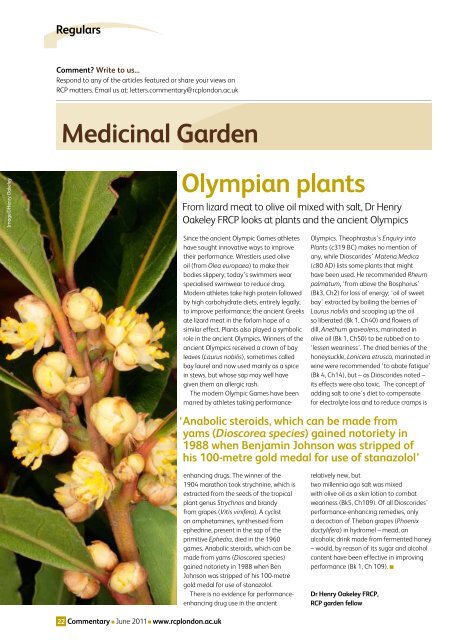Lindsey Davies: Q&A - Royal College of Physicians
Lindsey Davies: Q&A - Royal College of Physicians
Lindsey Davies: Q&A - Royal College of Physicians
You also want an ePaper? Increase the reach of your titles
YUMPU automatically turns print PDFs into web optimized ePapers that Google loves.
Regulars<br />
Comment Write to us...<br />
Respond to any <strong>of</strong> the articles featured or share your views on<br />
RCP matters. Email us at: letters.commentary@rcplondon.ac.uk<br />
Medicinal Garden<br />
Image©Henry Oakeley<br />
Olympian plants<br />
From lizard meat to olive oil mixed with salt, Dr Henry<br />
Oakeley FRCP looks at plants and the ancient Olympics<br />
Olympics. Theophrastus’s Enquiry into<br />
Plants (c319 BC) makes no mention <strong>of</strong><br />
any, while Dioscorides’ Materia Medica<br />
(c80 AD) lists some plants that might<br />
have been used. He recommended Rheum<br />
palmatum, ‘from above the Bosphorus’<br />
(Bk3, Ch2) for loss <strong>of</strong> energy; ‘oil <strong>of</strong> sweet<br />
bay’ extracted by boiling the berries <strong>of</strong><br />
Laurus nobilis and scooping up the oil<br />
so liberated (Bk 1, Ch40) and flowers <strong>of</strong><br />
dill, Anethum graveolens, marinated in<br />
olive oil (Bk 1, Ch50) to be rubbed on to<br />
‘lessen weariness’. The dried berries <strong>of</strong> the<br />
honeysuckle, Lonicera etrusca, marinated in<br />
wine were recommended ‘to abate fatigue’<br />
(Bk 4, Ch14), but – as Dioscorides noted –<br />
its effects were also toxic. The concept <strong>of</strong><br />
adding salt to one’s diet to compensate<br />
for electrolyte loss and to reduce cramps is<br />
‘Anabolic steroids, which can be made from<br />
yams (Dioscorea species) gained notoriety in<br />
1988 when Benjamin Johnson was stripped <strong>of</strong><br />
his 100-metre gold medal for use <strong>of</strong> stanazolol’<br />
Since the ancient Olympic Games athletes<br />
have sought innovative ways to improve<br />
their performance. Wrestlers used olive<br />
oil (from Olea europaea) to make their<br />
bodies slippery; today’s swimmers wear<br />
specialised swimwear to reduce drag.<br />
Modern athletes take high protein followed<br />
by high carbohydrate diets, entirely legally,<br />
to improve performance; the ancient Greeks<br />
ate lizard meat in the forlorn hope <strong>of</strong> a<br />
similar effect. Plants also played a symbolic<br />
role in the ancient Olympics. Winners <strong>of</strong> the<br />
ancient Olympics received a crown <strong>of</strong> bay<br />
leaves (Laurus nobilis), sometimes called<br />
bay laurel and now used mainly as a spice<br />
in stews, but whose sap may well have<br />
given them an allergic rash.<br />
The modern Olympic Games have been<br />
marred by athletes taking performanceenhancing<br />
drugs. The winner <strong>of</strong> the<br />
1904 marathon took strychnine, which is<br />
extracted from the seeds <strong>of</strong> the tropical<br />
plant genus Strychnos and brandy<br />
from grapes (Vitis vinifera). A cyclist<br />
on amphetamines, synthesised from<br />
ephedrine, present in the sap <strong>of</strong> the<br />
primitive Ephedra, died in the 1960<br />
games. Anabolic steroids, which can be<br />
made from yams (Dioscorea species)<br />
gained notoriety in 1988 when Ben<br />
Johnson was stripped <strong>of</strong> his 100-metre<br />
gold medal for use <strong>of</strong> stanazolol.<br />
There is no evidence for performanceenhancing<br />
drug use in the ancient<br />
relatively new, but<br />
two millennia ago salt was mixed<br />
with olive oil as a skin lotion to combat<br />
weariness (Bk5, Ch109). Of all Dioscorides’<br />
performance-enhancing remedies, only<br />
a decoction <strong>of</strong> Theban grapes (Phoenix<br />
dactylifera) in hydromel – mead, an<br />
alcoholic drink made from fermented honey<br />
– would, by reason <strong>of</strong> its sugar and alcohol<br />
content have been effective in improving<br />
performance (Bk 1, Ch 109). n<br />
Dr Henry Oakeley FRCP,<br />
RCP garden fellow<br />
22 Commentary n June 2011 n www.rcplondon.ac.uk

















